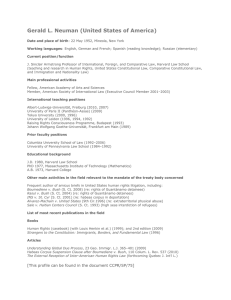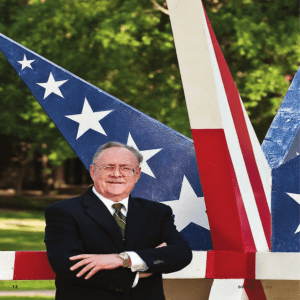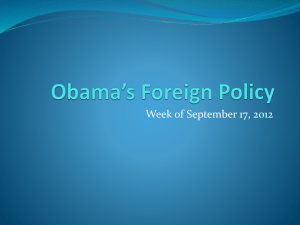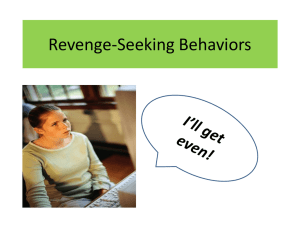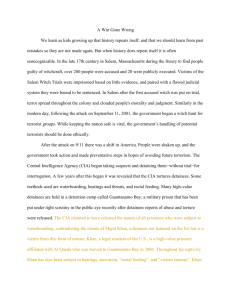The 9/11 Dilemma: Freedom vs. Security
advertisement
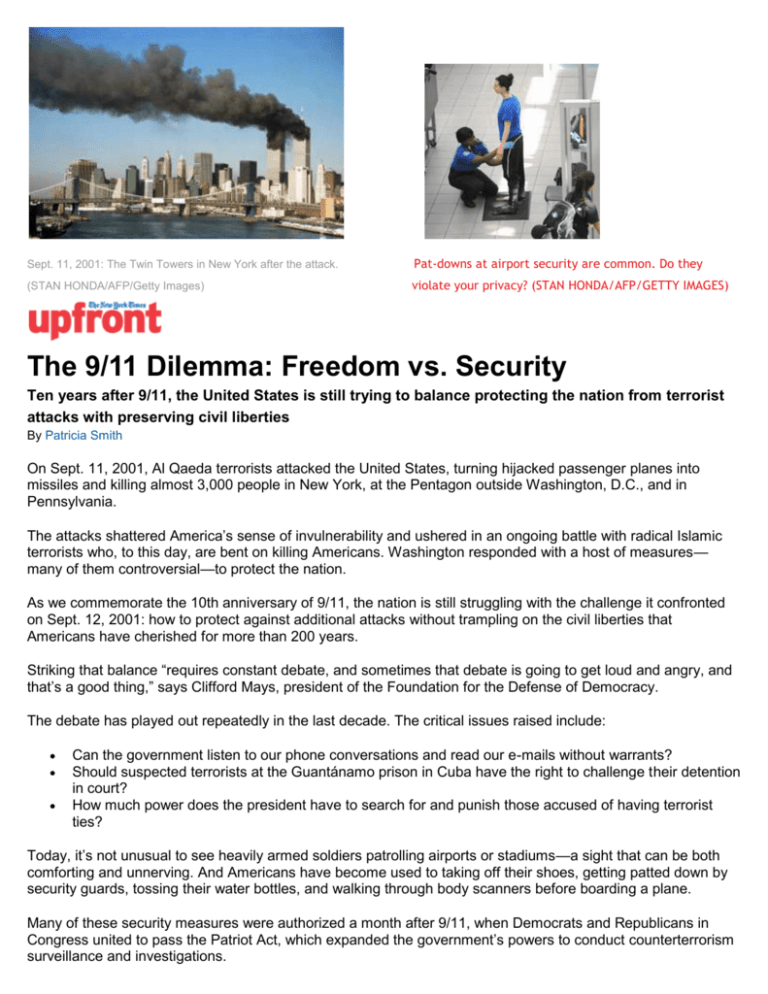
Sept. 11, 2001: The Twin Towers in New York after the attack. Pat-downs at airport security are common. Do they (STAN HONDA/AFP/Getty Images) violate your privacy? (STAN HONDA/AFP/GETTY IMAGES) The 9/11 Dilemma: Freedom vs. Security Ten years after 9/11, the United States is still trying to balance protecting the nation from terrorist attacks with preserving civil liberties By Patricia Smith On Sept. 11, 2001, Al Qaeda terrorists attacked the United States, turning hijacked passenger planes into missiles and killing almost 3,000 people in New York, at the Pentagon outside Washington, D.C., and in Pennsylvania. The attacks shattered America’s sense of invulnerability and ushered in an ongoing battle with radical Islamic terrorists who, to this day, are bent on killing Americans. Washington responded with a host of measures— many of them controversial—to protect the nation. As we commemorate the 10th anniversary of 9/11, the nation is still struggling with the challenge it confronted on Sept. 12, 2001: how to protect against additional attacks without trampling on the civil liberties that Americans have cherished for more than 200 years. Striking that balance “requires constant debate, and sometimes that debate is going to get loud and angry, and that’s a good thing,” says Clifford Mays, president of the Foundation for the Defense of Democracy. The debate has played out repeatedly in the last decade. The critical issues raised include: Can the government listen to our phone conversations and read our e-mails without warrants? Should suspected terrorists at the Guantánamo prison in Cuba have the right to challenge their detention in court? How much power does the president have to search for and punish those accused of having terrorist ties? Today, it’s not unusual to see heavily armed soldiers patrolling airports or stadiums—a sight that can be both comforting and unnerving. And Americans have become used to taking off their shoes, getting patted down by security guards, tossing their water bottles, and walking through body scanners before boarding a plane. Many of these security measures were authorized a month after 9/11, when Democrats and Republicans in Congress united to pass the Patriot Act, which expanded the government’s powers to conduct counterterrorism surveillance and investigations. But during and after the congressional debate, civil liberties groups said that parts of the law infringed on constitutional rights. They objected to things like the government’s new power to check library records to see what someone had been reading. Listening In? In 2002, President George W. Bush authorized the National Security Agency to monitor the phone calls and emails of hundreds, perhaps thousands, of Americans and others inside the U.S. suspected of terrorist ties, without first obtaining warrants. When the program became public in 2005, a firestorm erupted. Opponents cited the Fourth Amendment’s protection against “unreasonable searches and seizures,” which has been interpreted to mean that authorities must obtain court-issued warrants before conducting wiretapping or other types of monitoring. Bush argued the program was a legitimate exercise of presidential power. Security officials also cited concerns about situations in which delaying monitoring for a few hours while waiting for a warrant could result in the loss of critical intelligence that could stop an attack. In March 2010, a federal judge ruled that warrantless wiretapping is illegal. The Justice Department told Upfront the practice has been discontinued under the Obama administration. Soon after the 9/11 attacks, the U.S. took military action against those responsible: Al Qaeda and, indirectly, the Taliban rulers of Afghanistan, who had provided Al Qaeda terrorists with a base of operations. The U.S. soon found itself with a growing number of detainees captured in Afghanistan and elsewhere suspected of plotting attacks. How the U.S. has handled these terrorism suspects at the U.S. Naval base in Guantánamo Bay, Cuba, has been a subject of intense debate. The Bush administration labeled them “enemy combatants” and maintained they’re not entitled to constitutional protections since they’re not on American soil. Some of the detainees at Guantánamo undoubtedly represent real threats. But others may have just been in the wrong place at the wrong time. It’s hard to know, since many have been held for years without trial—a violation, civil liberties groups say, of the Fifth Amendment guarantee of “due process.” When President Obama took office in 2009, he promised to close Guantánamo within a year. But he’s having just as hard a time figuring out what to do with the detainees as Bush did. The Supreme Court ruled in 2008 that Guantánamo detainees have the right to challenge their detention in federal courts, but many questions remain, including how, where, and if to try the detainees. Methods for interrogating terrorism suspects have also generated controvery, raising questions about not only whether torture can be justified in efforts to prevent imminent attacks, but what the definition of torture actually is. The Bush Administration argued that harsh interrogation tactics—such as “waterboarding,” which simulates drowning—provided critical information that helped keep the nation safe and did not constitute torture. Critics said some of those tactics did rise to the level of torture, which presumably would violate the Constitution’s ban on “cruel and unusual punishment” and the Geneva Conventions. When President Obama took office, he vowed these techniques would stop, but it’s impossible to know for sure. In other ways, the Obama administration has moved to bolster the government’s power to investigate terrorist suspects. For example, the F.B.I. has expanded the powers of its agents, giving them the authority to go through household trash and conduct surveillance on anyone they find suspicious. ‘Walking a Tightrope’ The Obama administration is also considering exempting terrorism suspects from the Miranda rules: the requirement that suspects be informed of their Fifth Amendment right to an attorney and to not say anything that might incriminate them (the “right to remain silent.”) Civil liberties groups say this would further erode personal protections. Then there’s the case of Anwar al-Awlaki, an American-born radical Muslim cleric who advocates violent jihad against the U.S. The Obama administration has authorized the targeted killing of Awlaki, even though he’s an American citizen. In fact, the U.S. military tried to kill Awlaki in May, firing a missile from a drone aircraft in Yemen, where he’s believed to be hiding. “American citizenship doesn’t give you carte blanche to wage war against your own country,” says a counterterrorism official. “If you cast your lot with its enemies, you may well share their fate.” But the notion that the government can, in effect, execute one of its own citizens, without judicial process and based on secret intelligence, makes some legal authorities uneasy. “There’s no doubt that Al Qaeda will continue to pursue attacks against us,” Obama said in May, after U.S. Navy Seals killed Al Qaeda leader Osama bin Laden in Pakistan. “We must, and we will, remain vigilant at home and abroad.” Even the killing of the mastermind behind 9/11 sparked debate about whether the U.S. had lived up to its ideals. Mays of the Foundation for the Defense of Democracy thinks the nation needs to keep asking those kinds of questions. “Think about walking a tightrope,” he says. “The idea of finding a balance means that you’re leaning a little to one side and then a little to the other side, and that you may fall off occasionally.” This article originally appeared in the September 5, 2011, issue of The New York Times Upfront.
